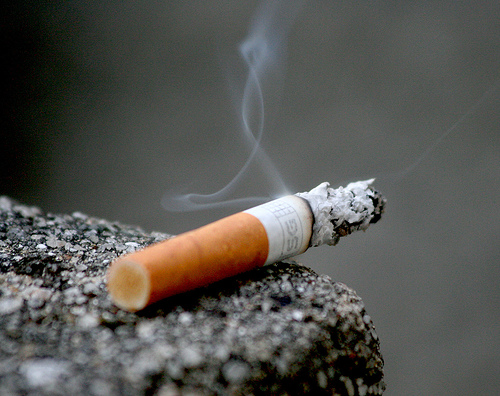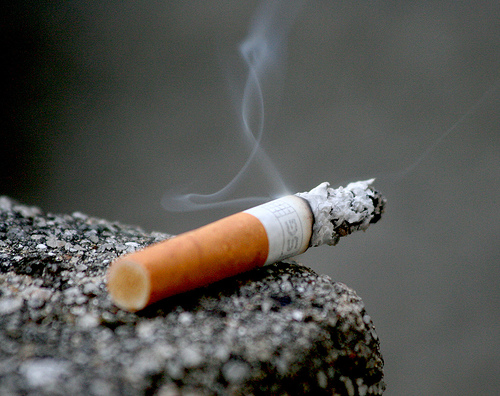 Photo: lanier67 via FlickrWith the arrival of this year’s 40th anniversary of Earth Day, it is encouraging to see more and more people, young and old, buying into a meaningful environmental ethic in their personal lives despite daunting environmental challenges. By carrying reusable grocery bags, taking public transit and recycling, to name just a few examples, we are all becoming increasingly aware of the need to be environmentally responsible. If you’re a smoker, there’s another very important step that would be a “twofer” win for your health and for the natural world: Quit for good!
Photo: lanier67 via FlickrWith the arrival of this year’s 40th anniversary of Earth Day, it is encouraging to see more and more people, young and old, buying into a meaningful environmental ethic in their personal lives despite daunting environmental challenges. By carrying reusable grocery bags, taking public transit and recycling, to name just a few examples, we are all becoming increasingly aware of the need to be environmentally responsible. If you’re a smoker, there’s another very important step that would be a “twofer” win for your health and for the natural world: Quit for good!
Surprisingly, many of us don’t know that quitting smoking is another way to help combat climate change, and to significantly reduce the incredible amount of waste and litter due to carelessly discarded cigarettes butts in streets, waterways, and public areas like parks and beaches. While tobacco is the No. 1 cause of preventable death in the U.S., responsible for more than 400,000 deaths each year, it is less known that cigarettes also play a major role as toxic, hazardous waste in our already-overburdened environment. Astonishingly, the remnants of cigarette smoking represent the most prevalent form of litter collected across the world.
According to data from the Ocean Conservancy, in 2009 more than 3 million cigarettes or butts were picked up internationally from beaches and inland waterways as part of the annual International Coastal Cleanup, including more than 1 million from U.S. beaches alone, making it by far the most littered item. We applaud the commitment by those national, state, and local environmental groups taking the lead in cleanup efforts.
We know that tobacco kills people, but do we ever wonder about the fragile ecosystems that are also affected by the toxins in these tobacco products? Tobacco growing leads to soil degradation; the wood used in the curing of tobacco can contribute to deforestation; and pesticides used to produce tobacco crops can harm the environment.
On the climate front, which most people believe to be the biggest environmental threat facing the planet, cigarette production and consumption contribute to global warming. For example, deforestation in order to grow tobacco and provide wood for curing it means fewer trees available to absorb carbon dioxide.
Smokers may be tossing their butts without even realizing their impact on the environment. It’s possible that smokers think that because tobacco is organic, its waste is harmless. However, that’s not the case. Both the plastic filters and the remnants of the tobacco are poisonous to children and other living organisms. They contain nicotine, heavy metals and other toxic compounds.
Tobacco industry research reveals that consumers might have misconceptions that cigarette filters are readily biodegradable or inconsequential as waste because of their small size. But biodegradation can take years, and even under ideal conditions filtered butts simply break up into small particles of toxic waste.
Smokers can help the environment by taking the simple yet effective step of not littering in the first place. Cigarette butt waste cleanup is very costly. An economic cigarette butt litter audit in San Francisco, which found the annual cleanup cost to be more than $7 million annually, led its City Council in 2009 to impose a 20-cent-per-pack “litter fee” on cigarettes sold in the city.
The sure-fire way to combat this growing problem is for more Americans to quit smoking, and for those of us who don’t smoke to support them. Quitting is a great way to live a longer, healthier life, just like having cleaner air in our homes, neighborhoods, work places, towns and cities. It is a tough addiction to break, but, with help and a plan, one can succeed. We hope that this 40th anniversary of Earth Day helps to remind smokers about cigarettes’ impact on the environment, and serves as a motivator to quit in order to leave a legacy of a more beautiful, healthy planet for future generations.
Erich Pica is president of Friends of the Earth, U.S., the U.S. voice of the world’s largest grassroots environmental network, working to protect our planet and its people.
Cheryl Healton is president and CEO of American Legacy Foundation, which is dedicated to building a world where young people reject tobacco and everyone can quit.



